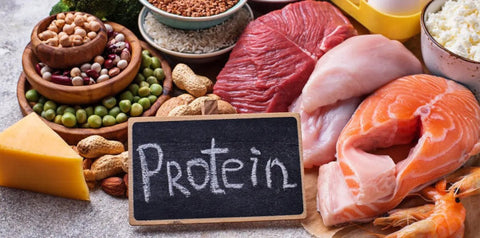There are three nutrients that we need in large amounts: protein, carbohydrates and fat.
What is protein?
Proteins are large molecules made up of one or more chains of amino acids in a specific order, and some of these amino acids can only be obtained through food. That is why they are called essential amino acids. The human body is unable to synthesize almost half of the twenty common amino acids. You must get them from your diet by eating foods high in protein. Animal protein sources such as meat, fish, eggs and milk provide all the essential amino acids. Vegetables such as beans, peas, chickpeas or lentils also provide valuable amounts of protein. However, in the case of vegetables, the essential amino acids are not all present. There are some that do not exist at all or exist only in small amounts.
Why do we need them and what is the function of proteins?
Proteins are important for the structure, function and regulation of cells, tissues and organs of the body. Each protein has unique functions. Proteins are important components of muscles, skin, bones and the body as a whole. Proteins are essential for the formation of enzymes, hormones and antibodies and are crucial for maintaining human health.
Protein is still one of the three types of nutrients used as energy sources by the body (with the exception of alcohol), the other two being carbohydrates and fats. Proteins and carbohydrates provide 4 calories of energy per gram, while fats just calories per gram.
According to the European Food Safety Authority, the population reference intake for adults of all ages was estimated at 0.8 g protein/kg body weight per day.
The World Health Organization (WHO) also recommends that adult women consume around 48g of protein per day and adult men around 56g. In Europe, average protein consumption ranges from 99 to 115g per day, and the WHO claims that protein deficiency was eliminated by the European Union after World War II. Therefore, very few Europeans today suffer from protein deficiency.
The question is whether there is a benefit to eating more protein even in the absence of protein deficiency.
Unless you are elderly and have muscle loss (sarcopenia) or are in recovery, there are no advantages to eating high amounts of protein. A normal, balanced diet provides more than the recommended amount of protein to maintain health. People who do moderate exercise day in and day out do not need more protein.
However, those who do high-intensity exercise daily could benefit from additional protein from food or other sources.
Protein for athletes
The American College of Sports Medicine in collaboration with the American Dietetic Association and the Dietetic Association of Canada recommend a daily intake of 1.2 to 2.0 g of protein / kg of body weight. These specific recommendations for athletes exceed those of the general population (0.8g/kg/day). This difference concerns the need for proteins for certain functions, namely:
- Repair and replenish damaged proteins with physical exercise at the musculoskeletal, bone, tendon and ligament level.
- Maintain an optimal function of all metabolic pathways that use amino acids.
- Activate the increase in muscle mass.
- Allow optimal immune system function.
- Allow optimal production rate of plasma proteins.
Conclusion
In summary:
- If you exercise at a moderate intensity, your normal diet covers your protein needs perfectly. Only if you're on an intensive training program can aiming for 1.2 to 2 grams of protein per pound of body weight help you reach your muscle growth and endurance goals.
- If you are doing endurance exercise, you should be taking in the lower end of this range.
- If you alternate between resistance and strength training, you should choose an average value and finally,
- If you are doing endurance/strength training, you should be taking in levels at the high end of this range.




Comments (0)
There are no comments for this article. Be the first one to leave a message!